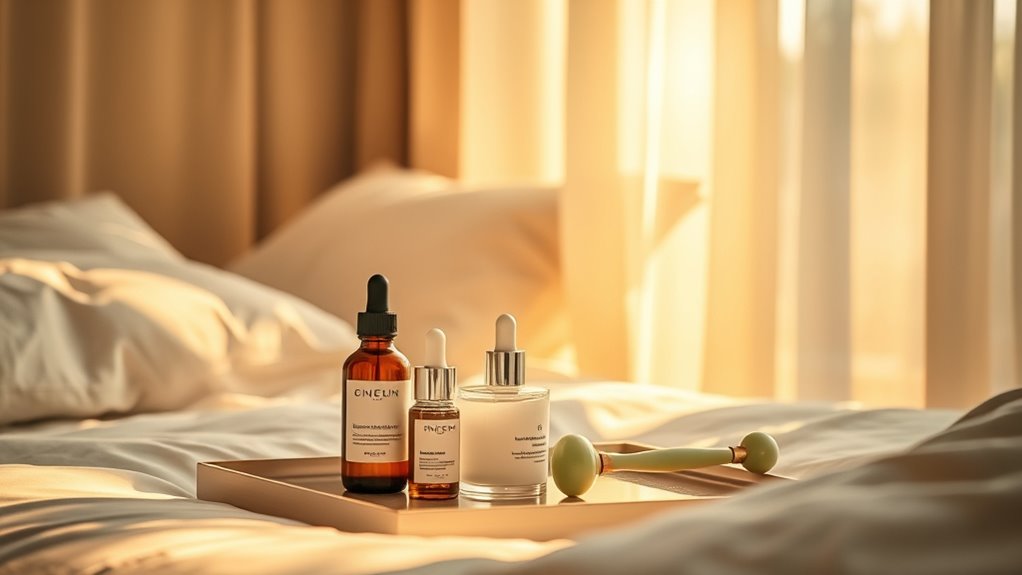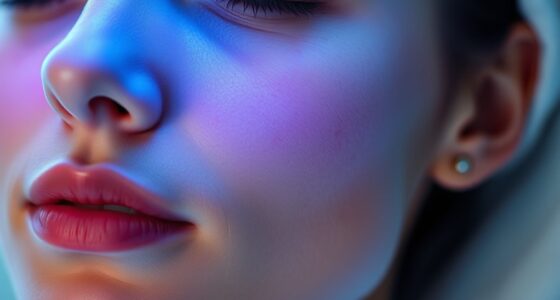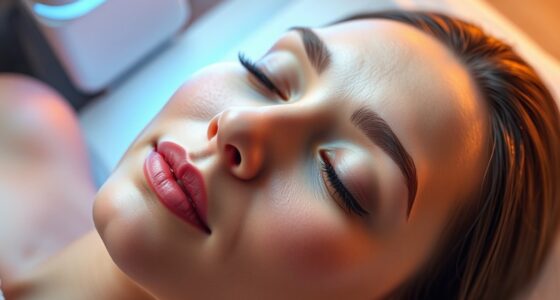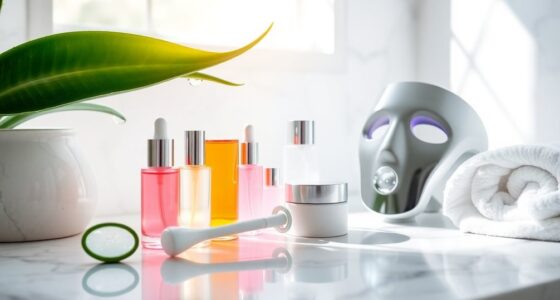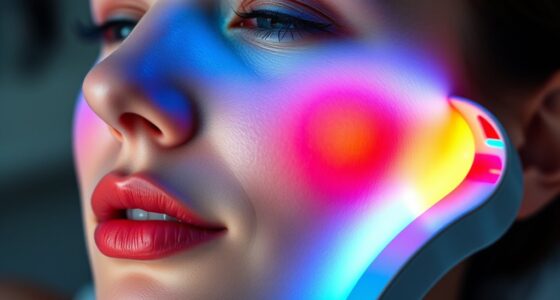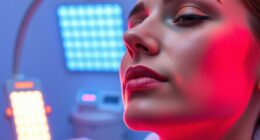Artificial and blue light from screens can disrupt your circadian rhythm, making it harder for your body to produce melatonin, the hormone that helps your skin repair overnight. When melatonin levels stay low, your skin can become dull, tired-looking, and prone to issues like fine lines or breakouts. By managing light exposure, especially before bed, you boost your skin’s natural renewal process. Keep going to discover simple tips that help protect your skin and restore your glow.
Key Takeaways
- Artificial and blue light exposure suppresses melatonin, impairing skin’s natural repair processes during sleep.
- Disrupted circadian rhythms delay skin regeneration, leading to dullness, puffiness, and dark circles.
- Proper light management, like dimming lights and avoiding screens before bed, enhances melatonin production.
- Melatonin acts as an antioxidant, protecting skin from free radicals and promoting a youthful complexion.
- Maintaining a natural light schedule supports circadian rhythm, improving overall skin health and sleep quality.
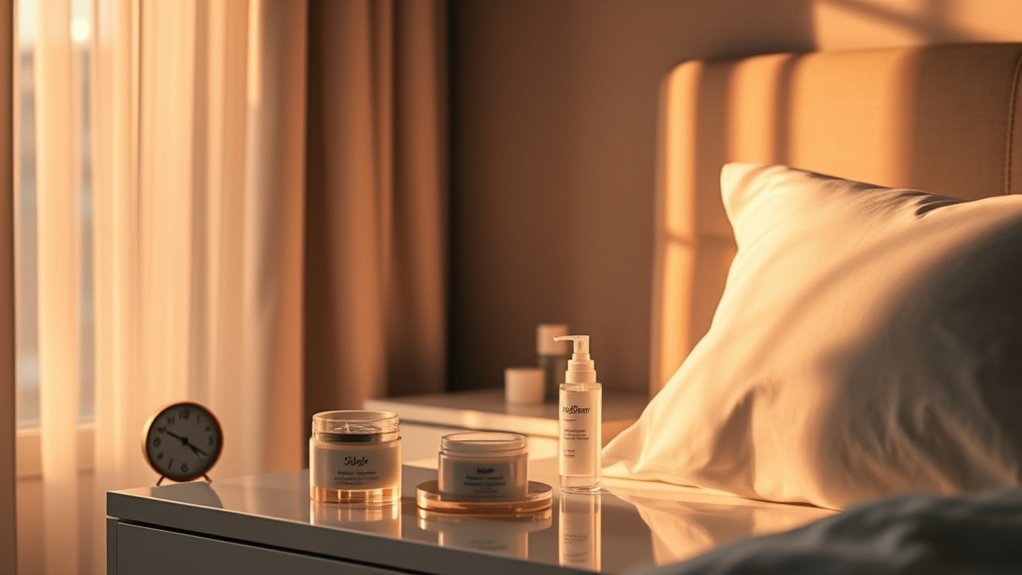
Getting enough quality sleep is vital for healthy skin, as your body repairs and regenerates skin cells while you rest. During deep sleep stages, your body ramps up processes like skin regeneration, helping to heal damage and maintain a vibrant complexion. One key factor influencing this process is melatonin production, which is naturally stimulated by darkness. When your environment is dark at night, your brain signals the pineal gland to release melatonin, a hormone that not only helps regulate your sleep-wake cycle but also promotes skin health.
Melatonin acts as a powerful antioxidant, fighting off free radicals that can damage skin cells and accelerate aging. As your melatonin levels rise in response to darkness, they support the skin’s natural repair mechanisms. Proper melatonin production guarantees that your skin regenerates efficiently, leading to a more even tone, reduced fine lines, and a healthier glow. Conversely, exposure to artificial light—especially blue light from screens—can suppress melatonin production, disrupting your circadian rhythm and impairing your skin’s ability to regenerate overnight.
Your circadian rhythm is fundamentally your internal clock, guiding your body’s processes in sync with the day-night cycle. When this rhythm is off due to light exposure at inappropriate times, your body struggles to produce enough melatonin, and skin regeneration slows down. This can result in dull, tired-looking skin and may exacerbate skin conditions like acne or eczema. You might also notice more puffiness, dark circles, or uneven pigmentation, all signs that your skin isn’t getting the restorative sleep it needs.
To optimize your skin’s health, aim to create a sleep environment that supports your circadian rhythm. Dimming lights in the evening and avoiding screens at least an hour before bed helps boost melatonin production. Investing in blackout curtains or using sleep masks can further block unwanted light, allowing your body to produce enough melatonin and maintain a healthy sleep cycle. When your circadian rhythm is aligned with natural light patterns, your body can focus on its repair and regeneration processes, giving your skin the best chance to look fresh and youthful.
Frequently Asked Questions
Can Skincare Products Improve Sleep Quality Directly?
Skincare products can improve your sleep quality indirectly by strengthening your skin barrier, which helps prevent irritation and promotes relaxation. When your skin barrier is healthy, products absorb better, ensuring active ingredients work effectively. Using calming, hydrating products before bed can soothe your skin and mind, making it easier to fall asleep. So, while they don’t directly enhance sleep, good skincare supports overall comfort, leading to better rest.
Does Nighttime Skincare Routine Affect Circadian Rhythm?
A nighttime skincare routine is like a gentle lullaby for your body’s internal clock, positively affecting your circadian rhythm. When you apply hydrating products, you support skin hydration, which can help your body produce melatonin naturally. This process promotes better sleep quality and helps regulate your rhythm. So, yes, your nighttime skincare routine can influence your circadian rhythm, making you feel more rested and refreshed each morning.
How Does Light Exposure Influence Skin Aging?
Light exposure impacts skin aging by influencing collagen synthesis and offering photoprotection benefits. When you’re exposed to UV rays, it can break down collagen, leading to wrinkles and sagging. On the other hand, protecting your skin from excessive sunlight helps preserve collagen and prevents premature aging. By limiting UV exposure and using photoprotection, you support healthier skin, maintain elasticity, and slow down the visible signs of aging.
Are There Specific Skincare Ingredients for Better Sleep?
Think of your skin as a night owl, needing the right ingredients to settle down. You can consider melatonin supplements or herbal remedies like valerian root or chamomile to promote better sleep. Look for skincare products with ingredients such as melatonin, lavender, or magnesium, which support relaxation. These help signal your body to wind down, making it easier to fall asleep and improve your overall sleep quality.
Can Skincare Habits Help Regulate Sleep in Shift Workers?
Yes, your skincare habits can support better sleep for shift workers. Focus on maintaining good sleep hygiene by using calming, non-irritating products before rest, which can help signal your body it’s time to wind down. Additionally, skincare with ingredients like antioxidants and hydration boosts can promote hormonal balance, reducing stress and improving sleep quality, even during irregular hours. Consistent routines reinforce your body’s natural rhythms, aiding in overall sleep regulation.
Conclusion
So, next time you’re tempted to skip your evening skincare or stay up late scrolling, remember how light exposure can throw off your circadian rhythm. Some theories suggest that limiting blue light before bed helps your skin and sleep stay in sync, making you feel more refreshed. By syncing your routines with your body’s natural clock, you might just wake up looking and feeling better—proof that good sleep and skincare go hand in hand.
